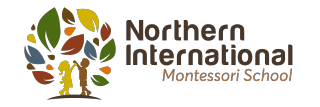

© Copyright © 2025 Northern International Montessori School
MONTESSORI
One of the key principles of Montessori education is to create a supportive and engaging learning environment that meets the individual needs and interests of each child. Children in Montessori schools are often given more autonomy and choice in their learning, which can help to foster a sense of ownership and pride in their accomplishments. This, in turn, can lead to higher levels of motivation and engagement, which can contribute to a greater sense of happiness and well-being.WHAT IS MONTESSORI EDUCATION?
Montessori education is a child-centered educational approach that was developed by Maria Montessori, an Italian physician and educator, in the late 19th and early 20th centuries. The Montessori method is based on the belief that children are naturally curious and creative, and that they have an innate drive to learn and develop. In a Montessori classroom, children are encouraged to learn at their own pace and through their own interests. The environment is designed to be hands-on and interactive, with materials and activities that are tailored to the individual needs and abilities of each child. The role of the teacher is to facilitate the learning process and provide support and guidance, rather than to lecture or direct the children. The Montessori method emphasizes the development of the whole child, including their physical, emotional, social, and cognitive skills. Children are encouraged to work collaboratively, think critically, and develop a sense of independence and self-discipline. The Montessori approach has been widely adopted in both public and private schools, and is used in classrooms around the world. Overall, Montessori education seeks to foster a love of learning, to help children develop their full potential, and to prepare them for success in all aspects of their lives.





















